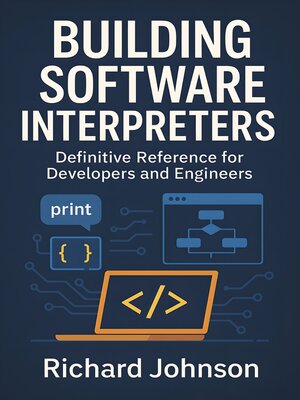Building Software Interpreters
ebook ∣ Definitive Reference for Developers and Engineers
By Richard Johnson

Sign up to save your library
With an OverDrive account, you can save your favorite libraries for at-a-glance information about availability. Find out more about OverDrive accounts.
Find this title in Libby, the library reading app by OverDrive.



Search for a digital library with this title
Title found at these libraries:
| Library Name | Distance |
|---|---|
| Loading... |
"Building Software Interpreters"
"Building Software Interpreters" is a comprehensive, authoritative guide to the design and implementation of modern interpreters for programming languages. Beginning with a thorough exploration of historical foundations and the key design tradeoffs between interpreters and compilers, this book delves into the fundamental architectural choices that shape how languages are executed. Readers will gain a deep understanding of interpreter classifications, requirements gathering, and how language features are influenced by execution architecture, establishing a solid conceptual base for both newcomers and seasoned developers.
This text presents a detailed, step-by-step journey through the vital components of interpreter construction. Topics such as lexical analysis, parsing, semantic analysis, and the development of robust abstract syntax trees are covered with practical insights and real-world examples. The discussion encompasses both hand-crafted and tool-based approaches to lexers and parsers, highlights error recovery strategies, and guides readers through symbol management, type systems, and advanced language features. Execution models—including tree-walkers, bytecode engines, and virtual machine architectures—are dissected with clarity, while chapters on memory management, runtime support, and extensibility provide actionable techniques for building efficient, maintainable software.
Advanced topics extend the text's relevance to the forefront of language implementation: meta-programming, debugging support, REPLs, sandboxing, concurrency, parallelism, distributed execution, and performance engineering are treated in depth. By weaving together theoretical rigor with hands-on engineering advice, "Building Software Interpreters" empowers readers to create interpreters that are not only correct and performant, but also secure, extensible, and ready for the demands of contemporary software development. This book stands as an essential reference for anyone interested in the science and practice of programming language interpretation.







